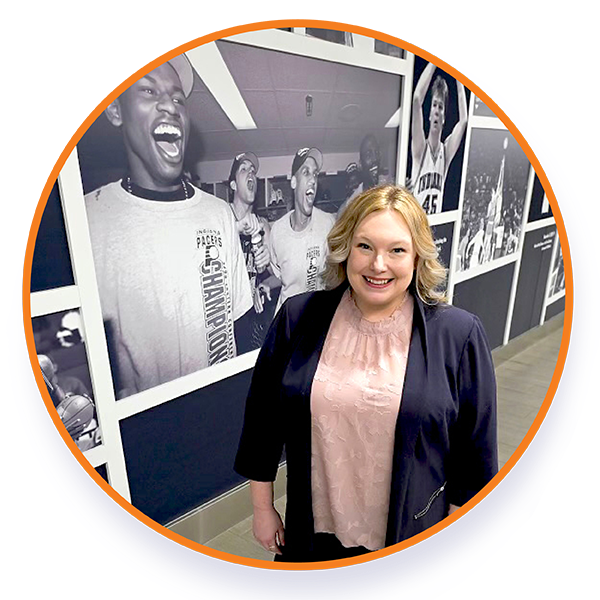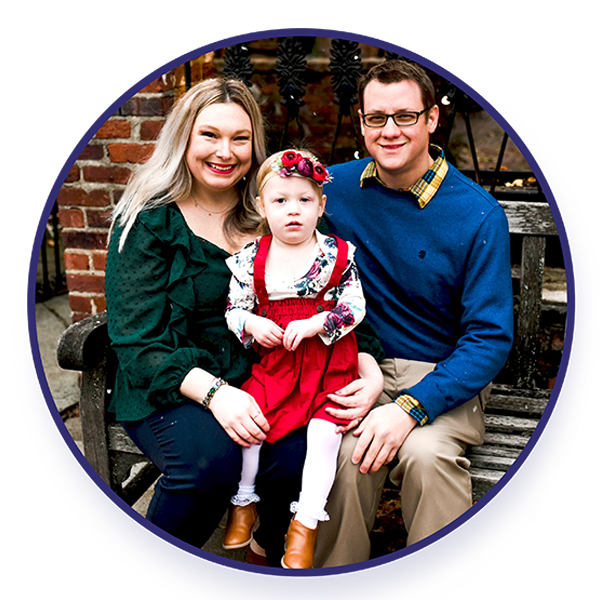Behind the Misconceptions: Hidden Disabilities
According to the National Center for Learning Disabilities, an estimated 15% of the U.S. population, equivalent to one in every seven individuals, grapples with a learning disability. This translates to roughly 10 million children and adults who confront learning challenges every day across the nation. Help us share stories of those living and thriving with hidden disabilities.
Meet Samantha.
“People assume that you see numbers and letters jumbled,” Samantha Halsema shared about misconceptions surrounding having both dyslexia and dyscalculia. Samantha was diagnosed with dyslexia, dyscalculia, and attention deficient hyperactive disorder (ADHD) in college when a professor noticed that despite attending all her classes and completing the assigned work, she was still falling behind.
Dyscalculia subtly sabotages one’s ability to grasp mathematical concepts, making it an uphill struggle to keep up with peers receiving identical instruction. It manifests in numerous ways and can affect the ability to grasp skills like counting, numerical working memory, pattern recognition, and our innate sense of time and direction. Simple tasks like estimating distance or volume, recalling math facts, or following procedures become daunting challenges. “For me, dyscalculia is having no concept of direction, it’s looking at an analog clock and having to count the minutes and every half hour, it’s not being able to do basic math outside of the things I have memorized. Even basic addition like seven plus eight requires me to use my fingers or write it out,” Samantha said sharing that even when she is faced with a more complex math problem, she will still struggle when writing it down, because it will inevitably breakdown into basic math.
Unlike a temporary delay, or situational learning loss like we have seen across grade bands post COVID 19 shutdowns, dyscalculia is a lifelong learning difference. Its impact extends beyond academics, seeping into economic prospects and gnawing at self-esteem.
Dyscalculia is recognized under the Individuals with Disabilities Education Act (IDEA) and the Americans with Disabilities Act (ADA). This recognition opens doors to accommodations in school and work environments, facilitated by an Individualized Education Program (IEP).
We sat down with Samantha to hear about her dyscalculia journey of discovery, advocacy, and acceptance as she progressed from elementary school, to college, and career.
Our Interview with Samantha Halsema

In your own words, can you explain what dyscalculia is and how you experience math?
For me, it’s how my brain processes the information, or perhaps the lack of processing. I can see the numbers fine, they aren’t jumbled, but I have trouble memorizing math facts, navigating through directions, reading analog clocks, and counting change. Working in retail was challenging because there’s an expectation to count change back. When someone would hand me a fifty-dollar bill and expect change, I couldn’t calculate it in my head or count it back to them. Altogether it’s my inability to process math and numbers, and how things go together when it comes to numbers.
When did you first notice that you were experiencing math differently, and what strategies or accommodations have you found helpful when learning math with dyscalculia?
I remember almost to the moment I realized that something was wrong, and looking back there were bells ringing–huge red flags–but I was so young, I didn’t know what was happening and I didn’t want to bring attention to it honestly. It was first grade, and I was handed what most would consider to be a straightforward timed math table on addition. I remember looking at that paper for however long until the timer went off, and in that time, I completed two or three problems. I didn’t have the most understanding teacher at the time, which led to my first known coping mechanism, which at the time, I considered cheating. I would get the paper, write down every number I knew for the answers, and wait for the teacher to take the paper. Upon seeing the incorrect answers, she would send me out to the hall to redo it, and that is where I could take my time and answer them on my own. I don’t think she was very happy with me, but I felt better about myself.
How and when were you diagnosed?
It wasn’t until college that I was diagnosed. I had one professor who approached me with my bad grades and had a conversation. She couldn’t reconcile that I could come to class, participate, turn in my assignments, but still not be able to grasp the concepts. She said, “It’s just not coming together for you, I think there’s something deeper happening.”
I was lucky enough that my university had a psychology center where students would go to complete their doctorate. My professor recommended I go there to have some tests run, and that is where we started a six-month long diagnosis process that led to my dyslexia, dyscalculia, and ADHD diagnosis.
Once identified, how was your experience with advocating for your needs?
During the diagnosis process I was politely asked to leave my university because of my grades. So, I was quickly thrust into advocating for myself, and that is what I did. I went to the school, met with my advisors, and pleaded my case. I knew I could succeed in school. I was willing to do anything, whether that meant staying outside their office every single day to study or getting a team of tutors. It was because of that mixture of finally having answers, advocating for myself, and finding an advocate who believed in me, that I was able to stay and complete my degree.
Once I had the diagnosis, it opened doors to additional resources and accommodations at my school. Just like any school, there were teachers who understood and were happy to accommodate whether that was letting me use a calculator or have extra time. On the other side, there were some professors who didn’t really understand. I think the biggest part was believing in myself.
How did having dyscalculia impact your confidence and self-esteem?
Back in elementary school it wasn’t as widely known, and there wasn’t a focus on investigating why certain students weren’t performing well. I often ask myself, “Why wasn’t someone asking why I couldn’t grasp certain concepts?” Back then I was labeled as lazy. There was less of a focus on why a couldn’t understand it, and that followed me through high school to where one guidance counselor advised me not to waste my money on going to college. It also affected my home life; I think the only time I ever got in trouble was related to my grades. My mom still feels horrible about that.
Once I got the official diagnosis and access to resources and professionals who understood what I was going through, it was a complete one-eighty turn. It changed my life.

What are some success stories you can share about your experience?
I went from having a one point something GPA to graduating college with honors. I doubled down and went back for my master’s degree, where I graduated at the top of my class. I went on to have a successful career in communications and media, and I have those experiences to make me more mindful and aware as my own child starts her educational journey.
The one story specifically that makes me feel really proud, was when I was in graduate school, and I was taking a statistics class. I love statistics and had to work with Excel a lot. I had the highest grade in my class, and my teacher was so surprised when I told her I had dyscalculia.
What do you want people to take away from reading your story?
For schools, I would hope that they would hear my story and approach a struggling student differently than they would have if they didn’t know about dyscalculia and some of the other hidden disabilities. That they would ask those questions to help determine the underlying cause, whether it is a learning disorder or not, and help facilitate those conversations with the parents. I know that is one thing my parents still hurt over, the not knowing.
For parents of students struggling in school, I would hope for a similar thread of understanding. As a parent myself, working through listening, seeing, and understanding the different ways my child processes information and her unique needs. I know that my experience has made me more aware of the voice I have in her education. You can be an advocate for your child in this. Don’t beat yourself up if you didn’t see something initially. We are continuous learners, and do the best with what we know, and adapt and grow when we learn new information.
For the child struggling, I see you trying. What you’re going through has a name, and there are people out there who will help you know what that name is, understand how you learn best, and give you the tools and opportunities to shine. Just because you may learn things differently doesn’t mean that you won’t be successful in your life and career. Keep trying.
Samantha Halsema is the Corporate Communications and Media Relations Manager for Pacers Sports & Entertainment. She’s a marketing and communications professional that spends her time sharing her journey as a mother and professional living with dyslexia, dyscalculia, ADHD, and bipolar disorder.
Learn more about dyscalculia on our website.
About TouchMath
TouchMath is an evidence-based, multisensory approach to mathematics that can help students when other Math learning solutions fail. If a student suffers from dyscalculia, they can still succeed in mathematics, and we have the resources to support you so you can better support them.
- Our Dyscalculia 101 page is your one-stop-shop for all things dyscalculia.
- Checkout our dyscalculia workshop sessions.
- Access our free dyscalculia screening tool.
- Download the full dyscalculia white paper by Dr. Sandra Elliott and Sam Wertheim, Doctoral Candidate.
We’re changing the way students experience math. Ready to talk interventions?
